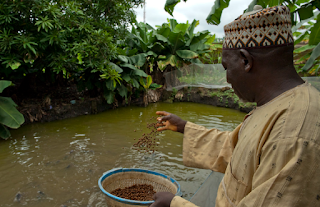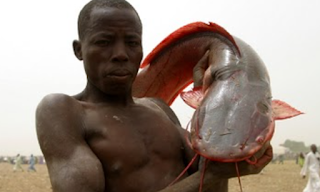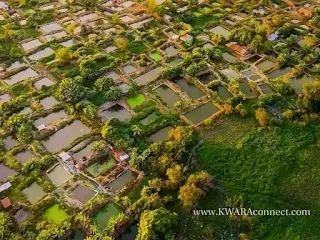Nigeria is one of the most populous countries on the African continent, with over 200 million people. Despite this, they rely on imported fish to satisfy local populations. But some states in Nigeria have large coastal populations and huge bodies of water ripe for harvesting aquatic life.

Which state in Nigeria produces the most fish? The answer may surprise you! In this comprehensive article, we'll take a look at which states lead in producing fish. You'll also discover why these particular areas are so well-suited for fishing. By the end, you'll have a clearer understanding of why these areas are an important part of Nigerian fish production.
1. Lagos State

Lagos state is one of the largest producers of fish in Nigeria. According to research, the state produced about 174,000 metric tonnes of fish. Thus, a significant part of the country's total fish production comes from the state.
Lagos is on the coast of Nigeria and has a long fishing history. The state has several lagoons, creeks, and coastal waters. And these are important fishing grounds for local communities and commercial fishermen. Besides traditional fishing, Lagos also has fish farms where fish are raised in ponds and tanks. Thus, providing a source of fresh fish for the local market.
Lagos state is home to several fish processing plants. Moreover, its fish products are exported to markets worldwide.
Overall, fishing and fish production are important economic activities in Lagos state, providing livelihoods and food for the local population.
2. Niger State

Niger State is in the north-central region of Nigeria and is famous for its large reservoirs and rivers. These rivers provide ideal conditions for fishing and aquaculture. Also, the state has a well-developed fishing industry, producing various fish species.
The farms are well-equipped with modern facilities and use the latest technology to produce high-quality fish. Even the state government provides financial help to the farmers to improve their production.
Due to the government's support, the state's fish production has increased significantly in recent years. They sell these fish in local markets and export to other parts of Nigeria and other countries.
3. Kebbi

Kebbi is one of the states with the highest fish production in Nigeria. The state has a vibrant fishing industry with over 35 large-scale fisheries. You'll find these fisheries along the Niger and Sokoto rivers, producing about 1.2 million tonnes of fish yearly. However, they comprise both commercial and subsistence fisheries. The state also has about 400 artisans and petty fishmongers.
Kebbi state, with a population of over 5 million, is one of the largest producers of fish in the country in terms of value. As a result, the fishing industry is a major contributor to the state economy.
The potential of the fishery sector is rapidly being realized. Yet, this can only be enhanced by establishing more fish processing industries and a reduction in the costs of production. The government of Kebbi State is also encouraging fish traders to ensure the best quality for consumers.
4. Delta
In Delta State, fish production is an important economic activity. The state is home to many fish farms, which produce a variety of fish species for both local and export markets.
Delta State is in the Niger Delta region of Nigeria, a major country's fish production center. The state has a long coastline, providing ideal fish farming conditions. Besides, the state has many rivers and lakes, which are also used for fish farming.
Most fish farms in Delta State are in the Delta Basin, a major center of fish production in Nigeria. The Delta Basin is home to a large number of freshwater fish species, which are cultivated for both local and export markets.
Delta State is a major producer of tilapia, catfish, and other freshwater fish species. Tilapia is the most popular fish species cultivated in the state and is exported to many countries. Catfish is also a popular species and is exported to many countries. Other freshwater fish species cultivated in Delta State include carp, barramundi, and Nile perch.
5. Bayelsa
Bayelsa State is the last on our list of states with the highest fish production in Nigeria. It is renowned for its abundant fish resources. The state has over 3,000 kilometers of coastline, providing ideal fish production conditions.
Also, the state has many freshwater rivers and streams, which are also home to various fish species.
The state government has strongly emphasized developing the fish industry and invested heavily in infrastructure and facilities. As a result, Bayelsa State is now one of the leading fish producers in Nigeria. The state is home to many large-scale fish farms, as well as many smaller-scale operations.
The fish industry in Bayelsa State employs many people and is an important source of income for the state. In addition, the fish industry plays a significant role in the state's economy, contributing millions of dollars each year.
6. Kwara

Kwara is another state with a vibrant fish production industry. The state has many rivers, streams, and lakes, providing ideal conditions for fish farming. Also, the government of Kwara State provides ample financial support to the fisheries sector to boost production.
The state is home to many large-scale commercial fish farms that produce a variety of fish species for local and export markets, including catfish. Kwara State is leading in the rapidly growing catfish production industry. It has been revealed that producers in the state generate and sell an impressive 20 tonnes of catfish worth N20 million every single day.
The success of catfish farming in Kwara can be attributed to initiatives taken by the fish farmers association, such as their investment in quality fish feed. These investments enable its members to operate on an economically viable scale, allowing them to achieve these levels of daily sales.
Further, the development proves that with hard work and smart investment, the potential for aquaculture production holds great promise for Kwara's economy in the future.
7. Akwa Ibom
Akwa Ibom State is both a riverine and coastal state, blessed with numerous water bodies, which makes it the perfect place for fishing and, thus, an important part of the state's economy. Fish production in Akwa Ibom State can be measured in metric tonnes from whole, value-added, or processed fish. For instance, in 2000–2001, an estimated 590 988 metric tonnes was produced from whole fish, value-added products, or processed products.
This figure has shown significant increases over time due to improved harvest techniques and better post-harvesting activities such as freezing, smoking, or drying processes that increase the shelf life of these goods.
Conclusion
Fish is an important source of food and income in Nigeria. Kebbi, Delta, and Bayelsa states are among the country's largest fish producers. These states have invested heavily in infrastructure and facilities to develop their fish industries. As a result, they are now among the leading fish producers in Nigeria.
 Sodiq J.
Sodiq J.
